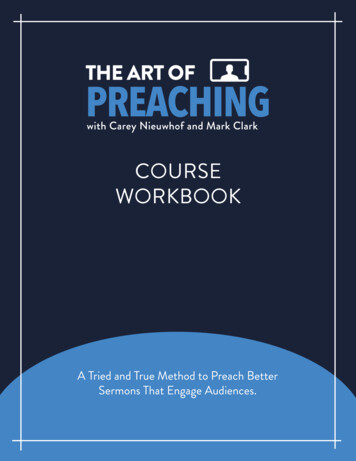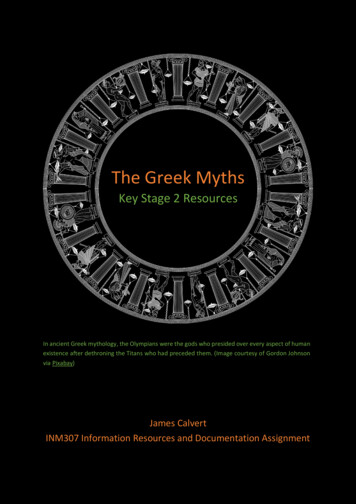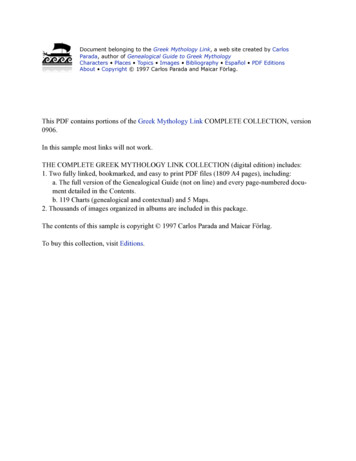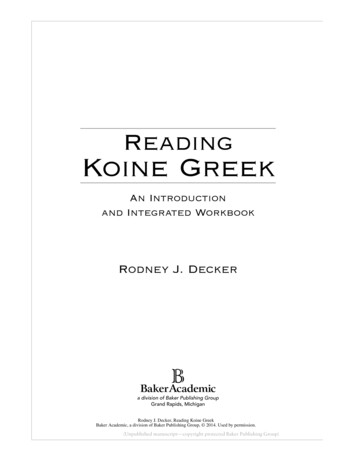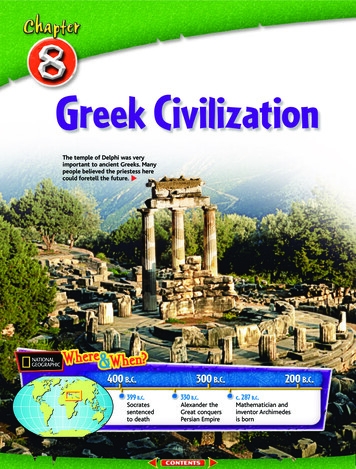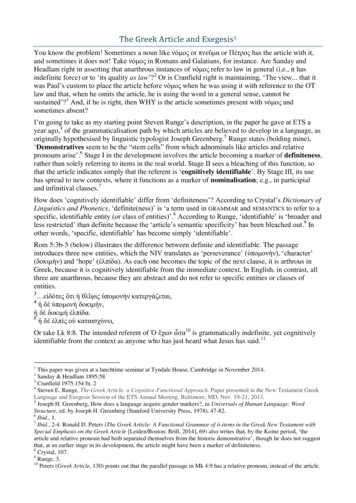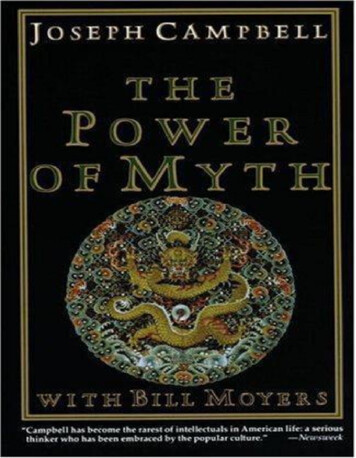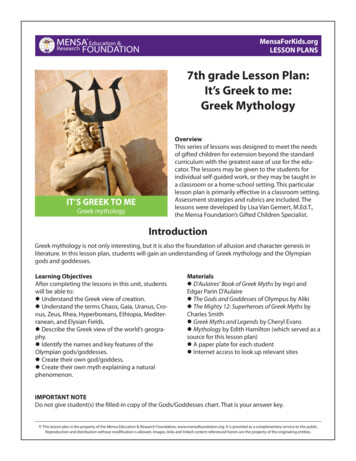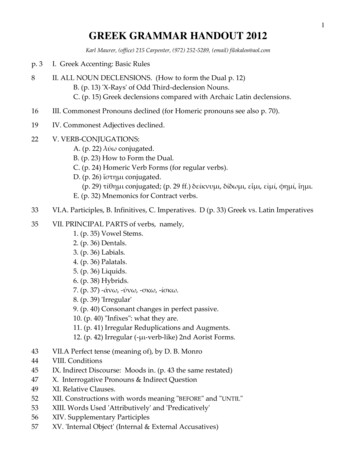
Transcription
Before ReadingPrometheusGreek Myth Retold by Bernard EvslinOrpheus and EurydiceGreek Myth Retold by Olivia CoolidgeVIDEO TRAILERKEYWORD: HML7-646Do you THINKbefore you act?RL 1 Cite textual evidence tosupport analysis of what the textsays explicitly. RL 10 Read andcomprehend literature. L 5b Usethe relationship betweenparticular words (e.g., antonym)to better understand each of thewords.Have you ever made a decision you wished you could take back? Ifso, then you know that your actions sometimes have consequences,or effects, that you didn’t bargain for. You’re not alone. As you’ll seein the Greek myths you’re about to read, people have been actingwithout thinking since ancient times.QUICKWRITE Think of a risky decision you might make, such aschoosing not to study for a test or choosing to make friends with aperson outside your group. What are the possible consequences ofthe decision, both negative and positive? Write a short paragraphexplaining whether you would be willing to face these consequences.646646-647 NA L07PE-u06s1-brProm.indd 6461/8/11 2:52:37 AM
text analysis: characteristics of mythsSince ancient times, people have passed down myths, orstories that explain mysteries of the universe. Most mythsshare these characteristics: They tell how something came to be, or they reveal theeffects of human behavior. They feature gods or other beings with supernatural powers.These beings often show such human qualities as anger.Many famous myths, like the ones you’re about to read,were first told in Greece over 3,000 years ago. As you read,note what the myths explain and how the gods act.reading strategy: ask QuestionsThe unusual characters, places, and situations in thesemyths may sometimes distract or confuse you. As youread, try monitoring, or checking, your understanding. Oneway to do this is by asking yourself questions about what’sgoing on. If you can’t answer, clarify your understanding byreading more slowly, going back, or reading on. Note yourquestions and the answers in a chart like the one shown.QWhat does Prometheusask Zeus?Avocabulary in contextIn the selections, the boldfaced words help tell what happenswhen the gods are disobeyed. Restate each sentence, usinga different word or words for the boldfaced terms.1.2.3.4.5.The gods were infinitely more powerful than the humans.He had little aptitude for following orders.He swore vengeance against his enemies.After her son was banished, she was inconsolable.She wanted to ascend the mountain where the gods lived.Complete the activities in your Reader/Writer Notebook.Meet the AuthorsBernard Evslin1922–1993Drawn to MythsIn the mid-1960s, BernardEvslin found his callingretelling myths andlegends. His 1986 bookHercules won theWashington IrvingChildren’s BookChoice Award.Olivia Coolidge1908–2006Bridging Pastand PresentAs a child, OliviaCoolidge and hersister made up fairytales to tell each other.As an adult, Coolidgebecame a famousreteller of Greektales and myths.background to the mythsZeus, Prometheus, and HadesThe Greek gods were not all equal inpower or status. Prometheus was apart of a family of giants, the Titans.Zeus defeated them and became rulerof all gods. He ordered Prometheus tocreate humans. Hades, who appearsin “Orpheus and Eurydice,” was theruler of the underworld. He, too,answered to Zeus.Authors OnlineGo to thinkcentral.com. KEYWORD: HML7-647647646-647 NA L07PE-u06s1-brProm.indd 6471/8/11 2:52:41 AM
Retold byBernard EvslinP10rometheus was a young Titan, no great admirer of Zeus. Althoughhe knew the great lord of the sky hated explicit questions, he didnot hesitate to beard1 him when there was something he wanted to know.One morning he came to Zeus and said, “O Thunderer, I do notunderstand your design. You have caused the race of man2 to appearon earth, but you keep him in ignorance and darkness.”“Perhaps you had better leave the race of man to me,” said Zeus.“What you call ignorance is innocence. What you call darkness is theshadow of my decree. Man is happy now. And he is so framed that hewill remain happy unless someone persuades him that he is unhappy.Let us not speak of this again.”But Prometheus said, “Look at him. Look below. He crouches in caves.He is at the mercy of beast and weather. He eats his meat raw. If youmean something by this, enlighten me with your wisdom. Tell me whyyou refuse to give man the gift of fire.” aNotice the expressionon the god’s face andthe position of his arms.What can you inferabout the emotion hemight be feeling?aGREEK MYTHSBased on theconversation betweenthe two gods, whataspect of the naturalworld do you think thismyth will explain?Make a prediction.1. beard: to confront or defy.2. man: In older translations, the expression man was commonly used to refer to all people.648unit 6: myths, legends, and tales648-651 NA L07PE-u06s1-Promet.indd 648Detail from Prometheus Carrying Fire, JanCossiers. Prado, Madrid. Art Resource,New York.1/8/11 2:55:04 AM
prometheus648-651 NA L07PE-u06s1-Promet.indd 6496491/8/11 2:55:18 AM
20304050Zeus answered, “Do you not know, Prometheus, that every gift bringsa penalty? This is the way the Fates3 weave destiny—by which godsalso must abide. Man does not have fire, true, nor the crafts which fireteaches. On the other hand, he does not know disease, warfare, old age,or that inward pest called worry. He is happy, I say, happy without fire.And so he shall remain.”“Happy as beasts are happy,” said Prometheus. “Of what use to makea separate race called man and endow4 him with little fur, some wit,and a curious charm of unpredictability? If he must live like this, whyseparate him from the beasts at all?”“He has another quality,” said Zeus, “the capacity for worship.An aptitude for admiring our power, being puzzled by our riddlesand amazed by our caprice.5 That is why he was made.”“Would not fire, and the graces he can put on with fire, make himmore interesting?”“More interesting, perhaps, but infinitely more dangerous. For thereis this in man too: a vaunting pride that needs little sustenance6 to makeit swell to giant size. Improve his lot, and he will forget that which makeshim pleasing—his sense of worship, his humility. He will grow big andpoisoned with pride and fancy himself a god, and before we know it,we shall see him storming Olympus. Enough, Prometheus! I have beenpatient with you, but do not try me too far. Go now and trouble me nomore with your speculations.”Prometheus was not satisfied. All that night he lay awake makingplans. Then he left his couch at dawn and, standing tiptoe on Olympus,stretched his arm to the eastern horizon where the first faint flames of thesun were flickering. In his hand he held a reed filled with a dry fiber; hethrust it into the sunrise until a spark smoldered. Then he put the reedin his tunic and came down from the mountain. bAt first men were frightened by the gift. It was so hot, so quick; it bitsharply when you touched it and for pure spite made the shadows dance.They thanked Prometheus and asked him to take it away. But he tookthe haunch of a newly killed deer and held it over the fire. And whenthe meat began to sear and sputter, filling the cave with its rich smells,the people felt themselves melting with hunger and flung themselveson the meat and devoured it greedily, burning their tongues.“This that I have brought you is called ‘fire,’” Prometheus said.“It is an ill-natured spirit, a little brother of the sun, but if you handleaptitude (BpPtG-tLdQ) n.natural abilityinfinitely (GnPfE-nGt-lC)adv. extremely; greatlySOCIAL STUDIESCONNECTIONMany settings in Greekmyths are real placesin Greece.bASK QUESTIONSMake sure youunderstand the conflictbetween Prometheusand Zeus. Whatquestions do you haveabout what has alreadyhappened and aboutwhat will happen next?3. the Fates: in Greek mythology, the three goddesses who decide the course of people’s lives.4. endow (Dn-douP): to provide with a quality or talent5. caprice (kE-prCsP): the quality of acting without planning or thinking beforehand.6. vaunting pride that needs little sustenance: boastful pride that needs little support.650unit 6: myths, legends, and tales648-651 NA L07PE-u06s1-Promet.indd 6501/8/11 2:55:20 AM
60it carefully, it can change your whole life. It is very greedy; you must feedit twigs, but only until it becomes a proper size. Then you must stop, orit will eat everything in sight—and you too. If it escapes, use this magic:water. It fears the water spirit, and if you touch it with water, it will flyaway until you need it again.”He left the fire burning in the first cave, with children staring at itwide-eyed, and then went to every cave in the land.T7080hen one day Zeus looked down from the mountain and was amazed.Everything had changed. Man had come out of his cave. Zeus sawwoodmen’s huts, farmhouses, villages, walled towns, even a castle or two.He saw men cooking their food, carrying torches to light their way atnight. He saw forges7 blazing, men beating out ploughs, keels, swords,spears. They were making ships and raising white wings of sails anddaring to use the fury of the winds for their journeys. They were wearinghelmets, riding out in chariots to do battle, like the gods themselves. cZeus was full of rage. He seized his largest thunderbolt. “So they wantfire,” he said to himself. “I’ll give them fire—more than they can use.I’ll turn their miserable little ball of earth into a cinder.” But thenanother thought came to him, and he lowered his arm. “No,” he saidto himself, “I shall have vengeance—and entertainment too. Let themdestroy themselves with their new skills. This will make a long, twistedgame, interesting to watch. I’ll attend to them later. My first businessis with Prometheus.”He called his giant guards and had them seize Prometheus, drag himoff to the Caucasus,8 and there bind him to a mountain peak with greatchains specially forged by Hephaestus9—chains which even a Titan inagony could not break. And when the friend of man was bound to themountain, Zeus sent two vultures to hover about him forever, tearingat his belly and eating his liver. dMen knew a terrible thing was happening on the mountain, but theydid not know what. But the wind shrieked like a giant in torment andsometimes like fierce birds.Many centuries he lay there—until another hero was born braveenough to defy the gods. He climbed to the peak in the Caucasus andstruck the shackles from Prometheus and killed the vultures. His namewas Heracles.10 !cGREEK MYTHSAccording to this myth,what event allowedpeople to build homes,farm, and go to war?vengeance (vDnPjEns)n. the infliction ofpunishment in return foran offensedASK QUESTIONSWhat does Zeus doto Prometheus, andwhy? To clarify theanswer, think aboutthe conflict betweenthe two gods. Thenreread lines 77–82.7. forges (fôrPjGz): places where metal is heated and hammered into shape.8. Caucasus (kôPkE-sEs): a mountainous region in southeastern Europe.9. Hephaestus (hG-fDsPtEs): the Greek god of fire and metalworking.10. Heracles (hDrPE-klCzQ): another name for Hercules, a son of Zeus who wasfamous for his great strength and courage.prometheus648-651 NA L07PE-u06s1-Promet.indd 6516511/8/11 2:55:21 AM
3. the Fates: in Greek mythology, the three goddesses who decide the course of people's lives. 4. endow (Dn-douP): to provide with a quality or talent 5. caprice (kE-prCsP): the quality of acting without planning or thinking beforehand. 6. vaunting pride that needs little sustenance: boastful pride that needs little support.
